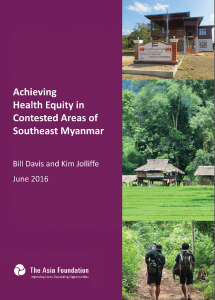Posts Tagged ‘The Asia Foundation’ (2 found)
Achieving Health Equity in Contested Areas of Southeast Myanmar
 Throughout decades of ethnic armed conflict, the governance environment in many of Myanmar’s non- Burman areas has become deeply fractured, as ethnic armed organizations (EAOs) have established parallel governance systems, including healthcare departments. This report gives an overview of the parallel Ministry of Health (MoH) and EAO-linked health systems that exist in southeast Myanmar, and looks at how coordination and cooperation have increased since ceasefires were signed in 2011 and 2012 […]
Throughout decades of ethnic armed conflict, the governance environment in many of Myanmar’s non- Burman areas has become deeply fractured, as ethnic armed organizations (EAOs) have established parallel governance systems, including healthcare departments. This report gives an overview of the parallel Ministry of Health (MoH) and EAO-linked health systems that exist in southeast Myanmar, and looks at how coordination and cooperation have increased since ceasefires were signed in 2011 and 2012 […]
Myanmar 2014: Civic Knowledge and Values in a Changing Society
 After decades of military rule and isolation, a new Asia Foundation survey shows Myanmar’s citizens are hopeful about the future – on elections, respondents say they believe in exercising their right to vote: 77 percent say that voting can lead to improvements in the future, just 10 percent say things will not change no matter how one votes. But this optimism is tempered by challenges that remain. The findings reveal limited knowledge among the public about government institutions and their functions, low level of social trust, a high degree of political polarization, and deep apprehension about economic opportunities.
After decades of military rule and isolation, a new Asia Foundation survey shows Myanmar’s citizens are hopeful about the future – on elections, respondents say they believe in exercising their right to vote: 77 percent say that voting can lead to improvements in the future, just 10 percent say things will not change no matter how one votes. But this optimism is tempered by challenges that remain. The findings reveal limited knowledge among the public about government institutions and their functions, low level of social trust, a high degree of political polarization, and deep apprehension about economic opportunities.









 All posts
All posts